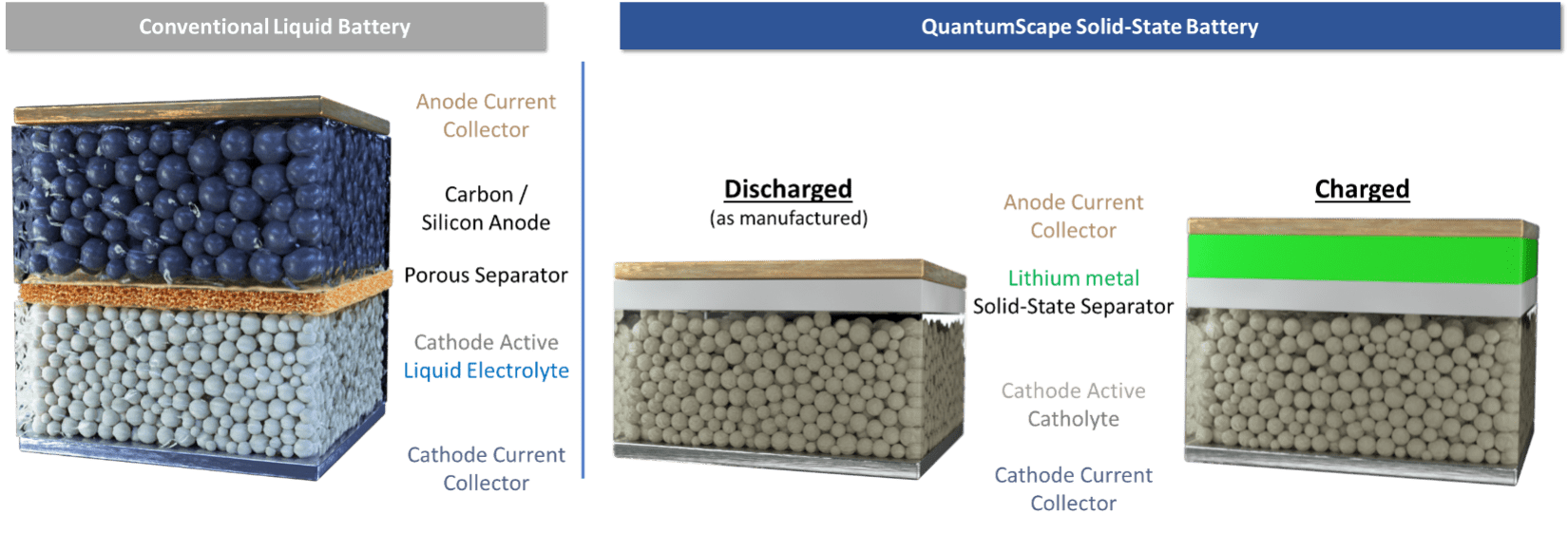Solid-state batteries
In recent years, the quest for more advanced and efficient battery technologies has led to exciting innovations in the field. Among these advancements, solid-state batteries have emerged as a promising contender, offering the potential for safer, more reliable, and higher-performing energy storage solutions. In this article, we will dive into the world of solid-state batteries, exploring their working principle, advantages, and the impact they may have on various industries.
Understanding Solid-state batteries #
Traditional lithium-ion batteries, widely used in portable electronics and electric vehicles, rely on liquid or gel electrolytes to facilitate the movement of lithium ions between the electrodes. In contrast, solid-state batteries employ solid electrolytes, eliminating the need for flammable liquids and enhancing safety and stability.
The key components of a solid-state battery include:
Solid electrolyte #
The solid-state battery features a solid electrolyte material, typically a ceramic or polymer, that enables the transport of lithium ions between the cathode and anode. Solid electrolytes offer improved thermal stability and prevent the formation of dendrites, which can cause short circuits and lead to battery failure.
Cathode #
The cathode, the positive electrode, is typically composed of lithium-containing materials, such as lithium cobalt oxide (LiCoO2), lithium iron phosphate (LiFePO4), or lithium nickel manganese cobalt oxide (NMC). These materials undergo electrochemical reactions with lithium ions during charging and discharging.
Anode #
The anode, the negative electrode, is commonly made of lithium metal or lithium-containing materials like lithium titanium oxide (Li4Ti5O12) or lithium metal oxides. It acts as the host for lithium ions during the battery's operation.
Current collectors #
Similar to traditional batteries, solid-state batteries utilize current collectors to facilitate the flow of electrons between the electrodes and the external circuit.
Advantages of Solid-State Batteries #
Solid-state batteries offer several advantages over conventional lithium-ion batteries, making them an exciting area of research and development. Here are some key benefits:
Enhanced safety #
The use of solid electrolytes significantly improves the safety of batteries. Solid-state batteries are less prone to thermal runaway and the associated risks of fire or explosion. The absence of flammable liquid electrolytes reduces the likelihood of electrolyte leakage or vaporization, enhancing overall safety.
Higher energy density #
Solid-state batteries have the potential for higher energy density, allowing for greater energy storage in a smaller and lighter package. This can lead to increased battery capacity, longer-lasting devices, and extended driving ranges for electric vehicles.
Faster charging and discharging #
Solid-state batteries can support faster charging and discharging rates compared to traditional lithium-ion batteries. The enhanced ion conductivity of solid electrolytes enables rapid lithium-ion transport, reducing charging times and improving device responsiveness.
Wide temperature range #
Solid-state batteries exhibit better performance across a wide temperature range. They can operate efficiently in extreme temperatures, making them suitable for applications in harsh environments or regions with extreme weather conditions.
Durability and longevity #
Solid-state batteries have the potential for improved cycle life, meaning they can undergo a higher number of charge-discharge cycles without significant capacity degradation. This increased durability contributes to longer-lasting batteries and reduced frequency of replacements.
Potential applications and future outlook #
Consumer electronics #
Solid-state batteries can power smartphones, laptops, wearables, and other portable electronic devices. Their higher energy density and improved safety make them an attractive choice for next-generation electronics.
Electric vehicles #
The automotive industry is closely monitoring the development of solid-state batteries. With their higher energy density, faster charging capabilities, and improved safety, solid-state batteries have the potential to revolutionize the electric vehicle market by enabling longer driving ranges and reducing charging times.
Renewable energy storage #
Solid-state batteries can play a crucial role in storing energy from renewable sources such as solar and wind. Their ability to store and discharge energy efficiently, combined with their durability and safety, makes them a viable option for residential and grid-scale energy storage systems.
While solid-state batteries hold tremendous promise, there are still challenges to overcome before they become commercially viable on a large scale. Researchers and engineers are actively exploring ways to optimize the performance, scalability, and manufacturing processes of solid-state batteries.
QuantumScape solid-state battery #
QuantumScape is a company at the forefront of solid-state battery technology. They have developed a unique solid-state battery that aims to address the limitations of traditional lithium-ion batteries.

QuantumScape's solid-state battery features a solid ceramic electrolyte and a lithium metal anode. The solid electrolyte replaces the liquid electrolyte found in conventional lithium-ion batteries, improving safety and eliminating the risk of electrolyte leakage or thermal runaway. The use of a lithium metal anode allows for higher energy density and faster charging rates.
One of the key advantages of QuantumScape's solid-state battery is its ability to operate at high temperatures. The solid electrolyte is stable and performs well in elevated temperatures, making it suitable for various applications. The battery also offers a long cycle life, with the capability to endure thousands of charge-discharge cycles without significant capacity degradation.
QuantumScape's solid-state battery has shown promising performance in terms of energy density, power output, and charge-discharge efficiency. It has the potential to revolutionize the electric vehicle industry by enabling longer driving ranges and shorter charging times.
While QuantumScape's solid-state battery technology is still in the development stage, it has garnered significant attention and investment due to its potential advantages. The company continues to refine and optimize its solid-state battery design, aiming for commercialization in the near future.
Conclusion #
Solid-state batteries represent a significant advancement in battery technology, offering improved safety, higher energy density, and faster charging capabilities. As research and development efforts continue, we can expect to witness further breakthroughs in solid-state battery technology, leading to exciting applications across numerous industries. The future of energy storage is bright, and solid-state batteries are poised to be at the forefront of this transformative journey.